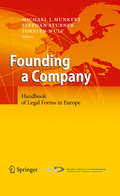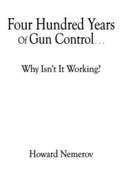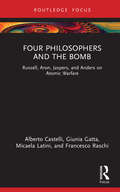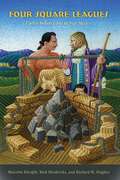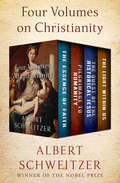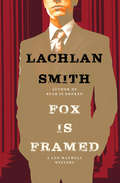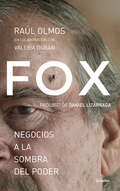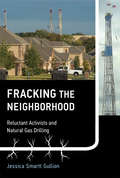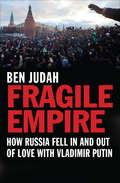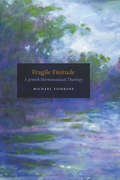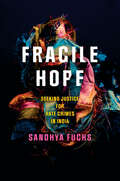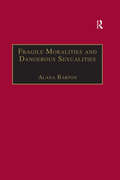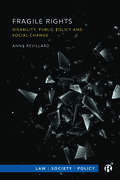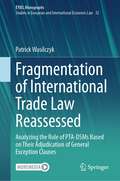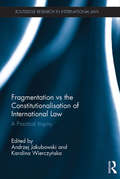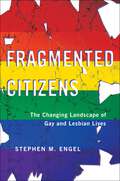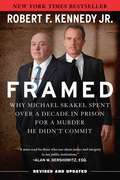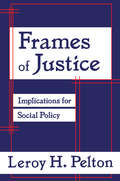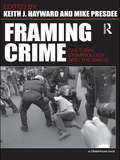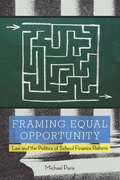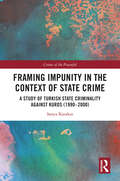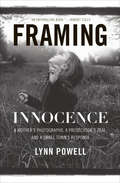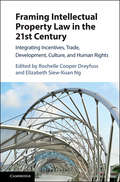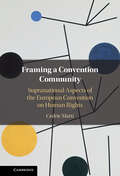- Table View
- List View
Founding a Company
by Michael J. Munkert Torsten Wulf Stephan StubnerThe book "Founding a Company - Handbook of Legal Forms in Europe" provides an easily accessible overview of the most important information any entrepreneur or manager needs when deciding for a legal form of the business. This makes it especially interesting for companies that decide to enter new markets within Europe and need to understand which requirements and advantages the different legal forms have. With the structured presentation of this information for ten different countries the book allows for quick comprehension and comparison of the aspects discussed. The book is a valuable resource for entrepreneurs, consultants and anybody who supports the business formation process in Europe as well as for lecturers and students working in this field.
Four Hundred Years of Gun Control: Why Isn't It Working?
by Howard NemerovThe subject of gun control for many seems to be a modern issue, but it has been with America since before the nation's inception. Has gun control best served the people or its architects? Investigative analyst Howard Nemerov compares the rhetoric and the legislation to the reality of how gun control's promises and laws have come to affect real people. Nemerov documents the pattern and practice as it has operated throughout the entire life of the nation to date. Today, the observation is that gun control has not worked...Or has it, and for whom? Otherwise, after four hundred years: Why isn't it working?
Four Philosophers and the Bomb: Russell, Aron, Jaspers, and Anders on Atomic Warfare (Routledge Studies in Social and Political Thought)
by Alberto Castelli Giunia Gatta Micaela Latini Francesco RaschiIn this book, Alberto Castelli, Giunia Gatta, Micaela Latini, and Francesco Raschi examine how four prominent intellectuals of the 20th century (Bertrand Russell, Karl Jaspers, Raymond Aron, and Günther Anders) understood atomic warfare. With a chapter devoted to the philosophical ideas of each thinker and how they understood and interpreted war, the authors analyze the historic-political context in which these ideas emerged and what they proposed to avoid a nuclear disaster.Four Philosophers and the Bomb will be of interest to students and researchers of peace studies, international relations, political philosophy, and moral philosophy.
Four Square Leagues: Pueblo Indian Land in New Mexico
by Rick Hendricks Malcolm Ebright Hughes W. RichardThis long-awaited book is the most detailed and up-to-date account of the complex history of Pueblo Indian land in New Mexico, beginning in the late seventeenth century and continuing to the present day. The authors have scoured documents and legal decisions to trace the rise of the mysterious Pueblo League between 1700 and 1821 as the basis of Pueblo land under Spanish rule. They have also provided a detailed analysis of Pueblo lands after 1821 to determine how the Pueblos and their non-Indian neighbors reacted to the change from Spanish to Mexican and then to U.S. sovereignty. Characterized by success stories of protection of Pueblo land as well as by centuries of encroachment by non-American Indians on Pueblo lands and resources, this is a uniquely New Mexican history that also reflects issues of indigenous land tenure that vex contested territories all over the world.
Four Volumes on Christianity: The Essence of Faith, Pilgrimage to Humanity, The Quest of the Historical Jesus, and The Light Within Us
by Albert SchweitzerFour of the Nobel Peace Prize–winning author&’s most influential, insightful, and inspiring works on theology and ethics in the modern world. Famous for founding the Albert Schweitzer Hospital in what is now the West African country of Gabon, Albert Schweitzer&’s ethical philosophy of &“Reverence for Life&” became one of the most influential ideas of the twentieth century. These four volumes chart the development of Schweitzer&’s philosophy from his student days to his career as a globally revered intellectual. The Essence of Faith: While studying for his PhD at the Sorbonne, Schweitzer developed his views on theology through an analysis of Immanuel Kant&’s philosophy of religion. In The Essence of Faith, Schweitzer explores Kantian ideas to arrive at an inspiring meditation on God, faith, and the limits of human understanding. Pilgrimage to Humanity: In Pilgrimage to Humanity, Schweitzer discusses his philosophy, his ministry in Africa, and his pursuit of world peace. He also explores the important contributions to civilization made by figures such as Johann Wolfgang von Goethe, J. S. Bach, and Jesus of Nazareth. The Quest of the Historical Jesus: In this landmark work of Biblical criticism, Schweitzer deconstructs the traditional myths of Jesus&’s life by offering rigorous textual analysis and historical evidence. By establishing the social and political climate of Jesus&’s time, Schweitzer not only dismantles the previously dominant images of Jesus, but also presents a compelling new theory of his own. The Light Within Us: In The Light Within Us, Schweitzer&’s longtime friend Richard Kik has compiled many of his most insightful and inspiring quotations. Drawn from his many writings, these quotations share Schweitzer&’s thoughts on service, gratitude, God, missionary work, and much more.
Fox Is Framed: A Leo Maxwell Mystery (The Leo Maxwell Mysteries #3)
by Lachlan SmithLachlan Smith won great critical acclaim for his first novel in the Leo Maxwell series, Bear Is Broken, a Shamus Award finalist and a Kirkus Reviews best book of the year that William Bernhardt called "one of the best debuts I’ve read in years.” The second Leo Maxwell mystery, Lion Plays Rough, continued the story, and now, in the utterly suspenseful Fox Is Framed, Smith confronts anew the drama that has haunted Leo-and his recently brain-damaged elder brother, Teddy-since childhood. Faced with evidence of stunning prosecutorial misconduct, a San Francisco judge has ordered a new trial for the Maxwell brothers’ father, Lawrence, who was convicted of killing their mother twenty-one years before. A prison snitch soon turns up dead, with Lawrence the only suspect, and Leo teams up with hotshot attorney Nina Schuyler to defend Lawrence against murder charges both old and new. Working the streets while Nina handles the action in the courtroom, Leo is forced to confront the darkness at the center of his life as he follows a trail of corruption and danger that leads to the very steps of City Hall. A tense, twist-filled courtroom procedural, Fox Is Framed barrels toward an unexpected conclusion, as Leo struggles to do right both by the law and his blood.
Fox: negocios a la sombra del poder
by Raúl Olmos Valeria DuránUn libro explosivo de periodismo de denuncia que revela los negocios de un gestor de lujo ante el gobierno federal. Desde los primeros años de su presidencia, Vicente Fox estuvo en el centro del huracán mediático, y no sólo por sus fallidas reformas políticas o sus célebres tropiezos verbales. Su nombre ha estado implicado en diversas investigaciones por tráfico de influencias y conflicto de intereses. Tal como lo demuestra aquí Raúl Olmos, el mismo personaje bravucón que prometía terminar con las "víboras prietas y tepocatas", usó el poder Ejecutivo para asegurar su futuro. Antes de llegar a Los Pinos, Fox afrontaba una situación económica familiar muy adversa. Sin embargo, como se documenta a lo largo de estas páginas, muchas de las acciones que llevó a cabo durante su sexenio respondieron no sólo a fines gubernamentales, sino a una estrategia para resarcir su patrimonio personal. Tras su administración, Fox siguió haciendo negocios a la sombra del poder, diversificando sus ingresos como empresario y convirtiéndose en un cabildero de lujo que ha recibido millones de dólares por su labor como intermediario para inversionistas extranjeros. Así, a partir de un riguroso ejercicio periodístico, este libro sigue la opaca ruta de la prosperidad del ex mandatario, que lo mismo ha incursionado en negocios inmobiliarios, de transporte, agropecuarios y hasta petroleros. A pesar de lo anterior, el llamado presidente de la alternancia ha insistido en defender su pensión de 205 mil pesos mensuales#
Fracking the Neighborhood: Reluctant Activists and Natural Gas Drilling (Urban and Industrial Environments)
by Jessica Smartt GullionWhat happens when natural gas drilling moves into an urban area: how communities in North Texas responded to the environmental and health threats of fracking.When natural gas drilling moves into an urban or a suburban neighborhood, a two-hundred-foot-high drill appears on the other side of a back yard fence and diesel trucks clog a quiet two-lane residential street. Children seem to be having more than the usual number of nosebleeds. There are so many local cases of cancer that the elementary school starts a cancer support group. In this book, Jessica Smartt Gullion examines what happens when natural gas extraction by means of hydraulic fracturing, or “fracking,” takes place not on wide-open rural land but in a densely populated area with homes, schools, hospitals, parks, and businesses. Gullion focuses on fracking in the Barnett Shale, the natural-gas–rich geological formation under the Dallas–Fort Worth metroplex. She gives voice to the residents—for the most part educated, middle class, and politically conservative—who became reluctant anti-drilling activists in response to perceived environmental and health threats posed by fracking.Gullion offers an overview of oil and gas development and describes the fossil-fuel culture of Texas, the process of fracking, related health concerns, and regulatory issues (including the notorious “Halliburton loophole”). She chronicles the experiences of community activists as they fight to be heard and to get the facts about the safety of fracking.Touted as a greener alternative and a means to reduce dependence on foreign oil, natural gas development is an important part of American energy policy. Yet, as this book shows, it comes at a cost to the local communities who bear the health and environmental burdens.
Fragile Empire: How Russia Fell In and Out of Love with Vladimir Putin
by Ben Judah&“A beautifully written and very lively study of Russia that argues that the political order created by Vladimir Putin is stagnating&” (Financial Times). From Kaliningrad on the Baltic to the Russian Far East, journalist Ben Judah has traveled throughout Russia and the former Soviet republics, conducting extensive interviews with President Vladimir Putin&’s friends, foes, and colleagues, government officials, business tycoons, mobsters, and ordinary Russian citizens. Fragile Empire is the fruit of Judah&’s thorough research: A probing assessment of Putin&’s rise to power and what it has meant for Russia and her people. Despite a propaganda program intent on maintaining the cliché of stability, Putin&’s regime was suddenly confronted in December 2011 by a highly public protest movement that told a different side of the story. Judah argues that Putinism has brought economic growth to Russia but also weaker institutions, and this contradiction leads to instability. The author explores both Putin&’s successes and his failed promises, taking into account the impact of a new middle class and a new generation, the Internet, social activism, and globalization on the president&’s impending leadership crisis. Can Russia avoid the crisis of Putinism? Judah offers original and up-to-the-minute answers. &“[A] dynamic account of the rise (and fall-in-progress) of Russian President Vladimir Putin.&” —Publishers Weekly &“[Judah] shuttles to and fro across Russia&’s vast terrain, finding criminals, liars, fascists and crooked politicians, as well as the occasional saintly figure.&” —The Economist &“His lively account of his remote adventures forms the most enjoyable part of Fragile Empire, and puts me in mind of Chekhov&’s famous 1890 journey to Sakhalin Island.&” —The Guardian
Fragile Finitude: A Jewish Hermeneutical Theology
by Michael FishbaneThe world we engage with is a vibrant collage brought to consciousness by language and our creative imagination. It is through the symbolic forms of language that the human world of value is revealed—this is where religious scholar Michael Fishbane dwells in his latest contribution to Jewish thought. In Fragile Finitude, Fishbane clears new ground for a theological life through a novel reinterpretation of the Book of Job. On this basis, he offers a contemporary engagement with the four classical types of Jewish Scriptural exegesis. The first focuses on worldly experience, the second on communal forms of practice and thought in the rabbinical tradition, the third on personal development, and the fourth on transcendent, cosmic orientations. Through these four modes, Fishbane manages to transform Jewish theology from within, at once reinvigorating a long tradition and moving beyond it. What he offers is nothing short of a way to reorient our lives in relation to the divine and our fellow humans. Written from within the Jewish tradition, Fragile Finitude is intended for readers across the religious spectrum.
Fragile Hope: Seeking Justice for Hate Crimes in India (South Asia in Motion)
by Sandhya FuchsAgainst the backdrop of the global Black Lives Matter movement, debates around the social impact of hate crime legislation have come to the political fore. In 2019, the UN Commission on Crime Prevention and Criminal Justice urgently asked how legal systems can counter bias and discrimination. In India, a nation with vast socio-cultural diversity, and a complex colonial past, questions about the relationship between law and histories of oppression have become particularly pressing. Recently, India has seen a rise in violence against Dalits (ex-untouchables) and other minorities. Consequently, an emerging "Dalit Lives Matter" movement has campaigned for the effective implementation of India's only hate crime law: the 1989 Scheduled Castes/Scheduled Tribes Prevention of Atrocities Act (PoA). Drawing on long-term fieldwork with Dalit survivors of caste atrocities, human rights NGOs, police, and judiciary, Sandhya Fuchs unveils how Dalit communities in the state of Rajasthan interpret and mobilize the PoA. Fuchs shows that the PoA has emerged as a project of legal meliorism: the idea that persistent and creative legal labor can gradually improve the oppressive conditions that characterize Dalit lives. Moving beyond statistics and judicial arguments, Fuchs uses the intimate lens of personal narratives to lay bare how legal processes converge and conflict with political and gendered concerns about justice for caste atrocities, creating new controversies, inequalities, and hopes.
Fragile Moralities and Dangerous Sexualities: Two Centuries of Semi-Penal Institutionalisation for Women
by Alana BartonIn this book Alana Barton explores the social control and disciplining of unruly and 'deviant' women from the early nineteenth century to the present day. Her particular focus is the 'semi penal' institution, a category that includes refuges, reformatories and homes. She suggests that these occupy a unique position within the social control 'continuum', somewhere between the formal regulation of the prison and the informal control of the 'community' or domestic sphere, but at the same time incorporating methods of discipline from both arenas. The book draws on Dr Barton's extensive fieldwork at one such institution, currently a women's bail and probation hostel, which opened as a reformatory in 1823. Barton begins by examining the ideological and social conditions underpinning the creation of this institution, deconstructing the dominant feminising discourses around domesticity, respectability, motherhood, sexuality and pathology that were mobilised to categorise and control its nineteenth-century residents. She goes on to discuss the contemporary experiences of women within the hostel and their strategies for coping with or resisting the disciplinary regimes and discourses imposed upon them. Her analysis reveals that many of the discourses used to characterise and discipline women in reformatories during the nineteenth century continue to be utilised for the same purpose in a probation hostel nearly two hundred years later. She also reveals that the distribution of power in institutions is not fixed, but can be subtly negotiated and redistributed. Concluding with an examination of current developments in community punishments for women, this book will make a significant contribution to the literature around alternatives to custody for female offenders by strongly challenging contemporary debates liberal, critical and feminist around ’appropriate’ and relevant penal policy for women.
Fragile Rights: Disability, Public Policy, and Social Change
by Anne RevillardThe French version of this book was the winner of the 2022 Grand Prix de la Protection Sociale. Over the years many disability-related rights have been legally recognized, but how has this changed the everyday lives of people with disabilities? Drawing on biographical interviews collected from individuals with mobility or visual impairments in France, this book analyses the reception of disability policies in the fields of education, employment, social rights and accessibility. It examines to what extent these policies contribute to the realization of associated rights among disabled people. The book demonstrates that the rights associated with disability suffer from major implementation flaws, while shedding light on the very active role of disabled citizens in the realization of their rights.
Fragmentation of International Trade Law Reassessed: Analyzing the Role of PTA-DSMs Based on Their Adjudication of General Exception Clauses (European Yearbook of International Economic Law #32)
by Patrick WasilczykThis book provides innovative and empirically based insights into the ongoing debate on the fragmentation of international trade law. It offers the reader a much-needed doctrinal overview of the different approaches to the issue of fragmentation and reveals their inherent methodological advantages and limitations. On this basis, the book then approaches the issue of fragmentation from an empirical standpoint by applying a novel dataset on Preferential Trade Agreements’ Dispute Settlement Mechanisms (PTA-DSMs), which have been used to adjudicate general exception clauses within the context of the individual PTA Members’ obligation to liberalize trade in goods. Although the results remain limited to the single issue of PTA-DSM adjudication for liberalization of trade in goods, they are indicative of key misconceptions regarding the fragmentation of ITL. As the findings confirm, the PTA-DSMs assessed have ultimately come to equivalent decisions, taking into consideration their overall use, the nature of the legal commitments embedded in the respective PTAs, and the economic wellbeing of the respective PTA partners. The book reveals the influence of specific PTA-DSMs on other PTA-DSMs and thereby paves the way for legal unification, rather than fragmentation.
Fragmentation vs the Constitutionalisation of International Law: A Practical Inquiry (Routledge Research in International Law)
by Andrzej Jakubowski Karolina WierczyńskaThe current system of international law is experiencing profound transformations. Indeed, the simultaneous processes of globalization combined with the disintegration of international systems of governance and law-making pose complex challenges for legal scholarship. The doctrinal response to these challenges has been theorized within two seemingly contradictory discourses in international law: fragmentation and constitutionalisation. This book takes an innovative approach to international law, viewing the processes of the fragmentation and constitutionalisation as being profoundly interconnected and reflective of each other. It brings together a select group of contributors, including both established and emerging scholars and practitioners, in order to explore the ways in which the problems of fragmentation and constitutionalisation are viscerally linked one to the other and thus mutually conditioning and stimulating. The book considers the theory and practice of international law looking at the two phenomena in relation to the various fields of international law such as international criminal law, cultural heritage law and international environmental law.
Fragmented Citizens: The Changing Landscape of Gay and Lesbian Lives
by Stephen M. EngelA sweeping historical and political account of how our present-day policy debates around citizenship and equality came to beThe landmark Supreme Court decision in June 2015 legalizing the right to same-sex marriage marked a major victory in gay and lesbian rights in the United States. Once subject to a patchwork of laws granting legal status to same-sex couples in some states and not others, gay and lesbian Americans now enjoy full legal status for their marriages wherever they travel or reside in the country. For many, the Supreme Court’s ruling means that gay and lesbian citizens are one step closer to full equality with the rest of America. In Fragmented Citizens, Stephen M. Engel contends that the present moment in gay and lesbian rights in America is indeed one of considerable advancement and change—but that there is still much to be done in shaping American institutions to recognize gays and lesbians as full citizens. With impressive scope and fascinating examples, Engel traces the relationship between gay and lesbian individuals and the government from the late nineteenth century through the present. Engel shows that gays and lesbians are more accurately described as fragmented citizens. Despite the marriage ruling, Engel argues that LGBT Americans still do not have full legal protections against workplace, housing, family, and other kinds of discrimination. There remains a continuing struggle of the state to control the sexuality of gay and lesbian citizens—they continue to be fragmented citizens. Engel argues that understanding the development of the idea of gay and lesbian individuals as ‘less-than-whole’ citizens can help us make sense of the government’s continued resistance to full equality despite massive changes in public opinion. Furthermore, he argues that it was the state’s ability to identify and control gay and lesbian citizens that allowed it to develop strong administrative capacities to manage all of its citizens in matters of immigration, labor relations, and even national security. The struggle for gay and lesbian rights, then, affected not only the lives of those seeking equality but also the very nature of American governance itself. Fragmented Citizens is a sweeping historical and political account of how our present-day policy debates around citizenship and equality came to be.
Framed: Why Michael Skakel Spent Over a Decade in Prison for a Murder He Didn't Commit
by Robert F. Kennedy Jr.On Halloween, 1975, fifteen-year-old Martha Moxley’s body was found brutally murdered outside her home in swanky Greenwich, Connecticut. Twenty-seven years after her death, the State of Connecticut spent some $25 million to convict her friend and neighbor, Michael Skakel, of the murder. The trial ignited a media firestorm that transfixed the nation. Now Skakel’s cousin Robert F. Kennedy, Jr., solves the baffling whodunit and clears Michael Skakel’s name. In this revised edition, which includes developments following the Connecticut Supreme Court decision, Kennedy chronicles how Skakel was railroaded amidst a media frenzy and a colorful cast of characters—from a crooked cop and a narcissistic defense attorney to a parade of perjuring witnesses.
Frames of Justice: Implications for Social Policy
by Leroy H. PeltonThis work is devoted to analyzing three major frames of justice--group justice, individual desert, and life affirmation--and their implications for social policy as well as their reflections in contemporary social policies. Pelton finds that all three frames of justice are reflected in the Bible and, later, the Koran. He contends that there is no evidence in the Bible of a genesis or development from one frame of justice to another. Rather, a sense of justice has existed in the human mind from time immemorial, with the three frames coexisting and manifesting themselves in both inter- and intra-group relations. The prominence of one frame over another at any particular point in history or in a particular geographical location is influenced by a variety of factors, though it is ultimately open to human choice.Pelton compares and contrasts the philosophies of nonviolence and liberalism in regard to the frames, and explores the relationships between principle, sentiment, reason, justice, and policy. He discusses social science's problematic relationship to justice in policymaking--for instance, how scholars have focused more on the effectiveness of policies, largely in terms of statistical outcomes reflecting aggregate data analyses, than on their justice. He goes on to explore in depth how frames of justice give direction to social policies, including those of genocide.Frames of Justice is an outstanding work that analyzes the question of justice and social policy, while simultaneously exploring the notion of desert in religion, philosophy, and legislation--especially within the context of the moral question of the relationship between means and ends--and contrasting it with the principle of life affirmation.
Frameworks for Water Law Reform
by Sarah HendryThe world is currently experiencing unprecedented global change, with population increase, urbanisation, climate change and environmental degradation combining to make management of freshwater resources a critical policy focus of the twenty-first century. This timely book designs and develops an original, analytical framework for water law reform processes, using case studies across four jurisdictions. Addressing the four principal areas of water law - integrated water resource management (IWRM) and river basin planning, water rights and allocation, water pollution and quality, and water services - this book provides a comprehensive study of water law, within the context of global and regional policy agendas. Case studies from England, Scotland, South Africa and Queensland, Australia, are presented, providing comparators from both common law and mixed jurisdictions, from the northern and southern hemispheres, and from developed and developing countries. A legislative framework is proposed for water law reform processes, and the consequences of different reform options are considered and investigated. A valuable resource for academics and graduate students in environmental law, resource management, hydrology and social science, this book is also highly relevant to policymakers, NGOs and legal practitioners.
Framing Crime: Cultural Criminology and the Image
by Keith J. HaywardIn a world in which media images of crime and deviance proliferate, where every facet of offending is reflected in a ‘vast hall of mirrors’, Framing Crime: Cultural Criminology and the Image makes sense of the increasingly blurred line between the real and the virtual. Images of crime and crime control have become almost as 'real' as crime and criminal justice itself. The meaning of both crime and crime control now resides, not solely in the essential – and essentially false – factuality of crime rates or arrest records, but also in the contested processes of symbolic display, cultural interpretation, and representational negotiation. It is essential, then, that criminologists are closely attuned to the various ways in which crime is imagined, constructed and framed within modern society. Framing Crime responds to this demand with a collection of papers aimed at helping the reader to understand the ways in which the contemporary ‘story of crime’ is constructed and promulgated through the image. It also provides the relevant analytical and research tools to unearth the hidden social and ideological concerns that frequently underpin images of crime, violence and transgression. Framing Crime will be of interest to students and academics in the fields of criminology, crime and the media, and sociology.
Framing Equal Opportunity
by Michael ParisIn order to illuminate the crucial and often neglected role of legal translation in litigation-driven reform efforts, Paris (political science, City U. of New York-College of Staten Island) explores legal aspects--lawyers, rights claims, litigation, courts, and the like--in struggles to produce more egalitarian school finance and education policies. He focuses attention on would-be reformers and their mobilization of law and courts. Comparative case studies in New Jersey 1970-2009 and Kentucky 1983-2009 demonstrate details about the interplay between law and politics in litigation-based reform projects. Annotation ©2010 Book News, Inc. , Portland, OR (booknews. com)
Framing Impunity in the Context of State Crime: A Study of Turkish State Criminality Against Kurds (1990- 2000) (Crimes of the Powerful)
by Sanya KarakasThis book introduces a new conceptual framework for impunity within state crime theory and uses Turkish state criminality against Kurds between 1990 and 2000 as a case study. It develops an understanding of impunity that goes beyond viewing the state solely as an actor, facilitator, or denier of crime. It argues for an expanded definition of state crime to encompass criminal acts and processes undertaken by states, including impunity.Building on field research, case analysis, and interviews, this book digs deep into the mechanics of impunity and ways in which the Turkish state has evaded punishment for its criminal acts. In doing so, Framing Impunity in the Context of State Crime uncovers a close connection between the crimes of the government and the impunity which allowed those crimes to flourish. It demonstrates that state violence and impunity are endemic in the structural design of the Turkish state and serve to further both the state goals of ethnic and religious assimilation and the subsequent persecution of those who refused to be assimilated into the new state construction. The book uses Stanley Cohen’s work on states of denial techniques to examine how states justify their illegal acts in order to deny and/or to evade responsibility for their crimes. Cohen’s work on denial at the organisational level is central to the question of impunity because, as a form of state crime, impunity involves various state institutions or actors representing the very state machinery deployed to conceal and deny state criminality.An accessible and compelling read, this book will appeal to law students, scholars, researchers, NGOs, and civil society organisations. It will have broader applicability beyond the case study of Turkey and will be valuable to academics and policymakers worldwide who focus on the intersection of state crime and impunity.
Framing Innocence: A Mother's Photographs, a Prosecutor's Zeal, and a Small Town's Response
by Lynn PowellThe harrowing true story of a mother whose innocent photos of her daughter resulted in child pornography charges—&“an enthralling book&” (Robert Coles). When Oberlin, Ohio, resident Cynthia Stewart dropped off eleven rolls of film at a drugstore near her home, she had no idea that two snapshots of her eight-year-old daughter would cause the county prosecutor to arrest her, take her away in handcuffs, threaten to remove her child from her home, and charge her with crimes that carried the possibility of sixteen years in prison. Thankfully, Cynthia&’s community came to her defense and supported her through the long legal battle. In Framing Innocence, poet and author Lynn Powell—who was one of Cynthia&’s neighbors—brilliantly probes the many questions raised: when does a photograph of a naked child cross the line from innocent snapshot to child pornography? When does a prosecution cross the line from vigorous to overzealous? When does the parent, and when does the state, know best? This &“fascinating . . . immediate and compelling&” story plumbs the perfect storm of events that put a loving family in a small American town at risk (Booklist). &“[A] well-written, absorbing book.&” —The Plain Dealer
Framing Intellectual Property Law in the 21st Century: Integrating Incentives, Trade, Development, Culture, and Human Rights
by Rochelle Cooper Dreyfuss Elizabeth Siew-Kuan NgAs knowledge production has become a more salient part of the economy, intellectual property laws have expanded. From a backwater of specialists in patent, copyright, and trademark law, intellectual property has become linked to trade through successive international agreements, and appreciated as a key to both economic and cultural development. Furthermore, law has begun to engage the interest of economists, political theorists, and human rights advocates. But because each discipline sees intellectual property in its own way, legal scholarship and practice have diverged, and the debate over intellectual property law has become fragmented. This book is aimed at bringing this diverse scholarship and practice together. It examines intellectual property through successive lenses (incentive theory, trade, development, culture, and human rights) and ends with a discussion of whether and how these fragmented views can be reconciled and integrated.
Framing a Convention Community: Supranational Aspects of the European Convention on Human Rights
by Cedric MartiThe European Convention on Human Rights (ECHR) has evolved from an international agreement into a highly integrated legal community with an ever more pervasive effect on domestic law and individuals. The supranational authority of the European Court of Human Rights bypasses the nation state in a growing number of other areas. Understanding the evolution of the ECHR and its Court may help in explaining and contextualising growing resistance against the Court, and in developing possible responses. Examining the Convention system through the prism of supranationality, Cedric Marti offers a fresh, comprehensive and interdisciplinary perspective on the expanding adjudicatory powers of the Court, including law-making. Marti addresses the growing literature of institutional studies on human rights enforcement to ascertain the particularities of the ECHR and its relationship to domestic legal systems. This study will be of great value to both scholars of international law and human rights practitioners.
